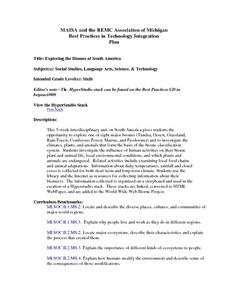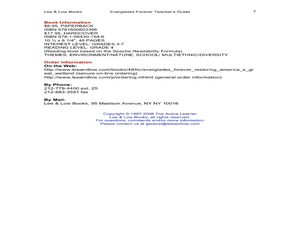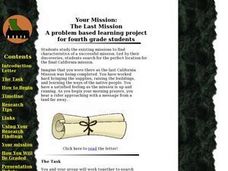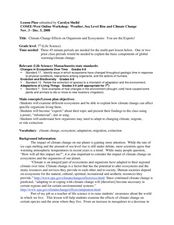Curated OER
Adaptations to Environments with Mammals
Fifth graders, after viewing a PowerPoint on different mammals, analyze what a biome is. Then they choose a mammal to research and go outside to feel the grass and leaves and hypothesize about which biome they live in as well as its...
Curated OER
Animal Adaptations
Fifth graders discover the adaptation of species through analyzing pictures. In this scientific discovery lesson, 5th graders discuss the concept of adaptation in order for survival. Students view many images of extinct...
Curated OER
Top 10 Summer Science Lesson Plans
Make this summer an exciting learning experience for your students with these engaging science activities!
Curated OER
Exploring the Biomes of South America
Sixth graders complete a five-week unit investigating the eight major biomes of South America. They conduct Internet research, collect short-term and long-term climate data, and create a HyperStudio slideshow stack about a selected biome...
Curated OER
Scientific Inquiry
Sixth graders research the theories on the extinction of the dinosaurs. In this dinosaur extinction activity, 6th graders view a video clip about scientific inquiry. They work in groups to research the two theories on dinosaur extinction.
Curated OER
What is a Seed?
First graders identify the parts of a seed. In this plant biology lesson, 1st graders are given a seed and identify each part of the seed by using a hand lens. Students plant a seed and graph the growth.
Curated OER
6: Parts of a Flower
Students draw and label the parts of a flower using a coin from the Northern Mariana Islands. For this flower parts lesson, students look at a transparency of the reverse side of a quarter from the Mariana lslands. They discuss the...
Curated OER
Food Webs
Students identify predator/prey relationships based on the food web of the tropical rain forest ecosystem and realize they need a food web for survival. In this food web lesson plan, students complete a role play activity being animals...
Curated OER
Food Chains
Fourth graders study food chains, producers, consumers, and decomposers. They play a food chain game and create food chain mobiles or posters. They take a nature hike around the school and observe various parts of a food chain.
Curated OER
Landscaping for Wildlife
Students identify the essential elements needed for promoting wildlife habitat. They describe the terms used in habitat design and the shelter for wildlife. Students explore how to create a pond to support wildlife and how to create a...
Curated OER
Scientific Inquiry
Learners create a poster. In this recycling lesson, students discuss pollution and the ways humans negatively affect the environment. Learners describe examples of litter or pollution they have experienced. Students collect litter from...
Curated OER
What's In Our Backyard?
Eighth graders investigate the importance of an ecosystem by studying their own backyards. In this environmental lesson, 8th graders examine a schoolyard or backyard by marking quadrants and recording any animal or plant findings...
Curated OER
What Makes a Cat a Cat?
Students investigate the lives of pets by videotaping them. In this animal life lesson, students videotape a cat and other pets using school cameras in a computer lab. Students review the footage from the cat and other...
Curated OER
Everglades Forever
Students complete pre reading, writing, during reading, and interdisciplinary activities for the book Everglades Forever. In this reading lesson plan, students complete journal entries, answer short answer questions, have discussions,...
Curated OER
Contrasting Landscapes - UBC Farm Field Trip
Students visit the UBC Farm. In this lesson on various landscapes, students spend a day at the University of British Columbia exploring the farm and trail adjoining the campus. This lesson could be modified for use in any region that has...
Curated OER
Your Mission: The Last Mission
Fourth graders develop a research report to determine the best location for the final California mission. They conduct Internet research, create charts and diagrams, and develop a presentation.
Curated OER
Desert Adaptations
In this desert adaptations worksheet, students are given a water filled sponge which represents an animal. Students observe their "animal" for a 24 hour period and conserve the water in the sponge as best they can. They measure and...
Curated OER
Map Your State: Regions of Arizona
Fourth graders define vocabulary and locate physical features on maps. In this mapping activity, 4th graders explore regions of Arizona through landforms found on topographic maps. Students research the history and culture of...
Curated OER
Wetland Food Webs
Young scholars study life science. In this food webs and food chains comparison lesson, students examine the wetlands to discover the relationships that exist between the animals that live there. They participate in group activities and...
Curated OER
Blame It On El Nino
Students understand what the weather phenomenon El Nino is and what causes it. Students recognize how remote sensing technology can detect and predict El Nino. Students discover how El Nino effects weather conditions throughout the globe...
Curated OER
Ocean Expedition with Jacques Cousteau
Learners role play that they are on an ocean voyage with Jacques Cousteau as they study plant, and animal species and adaptation. They write a five page journal, create artwork of the expedition.
Curated OER
How Much is Dirt Worth?
Fourth graders graph the percentages of the materials that make up the Earth and complete computations based on their results. In this topsoil lesson, 4th graders diagram the different layers of Earth's composition.
Curated OER
Hand Washing: I can handle it!
Sixth graders examine microorganisms. In this germs lesson, 6th graders observe and record data on the positive and negative aspects of microorganisms. Students complete activities, view a film, and explore websites.
Curated OER
Climate Change Effects on Organisms and Ecosystems: You are the Experts!
Seventh graders research about the effect of climate on different ecosystems. In this life science lesson, 7th graders present their research by creating a poster, infomercial, skit or song. They discuss how organisms adapt to climate...























